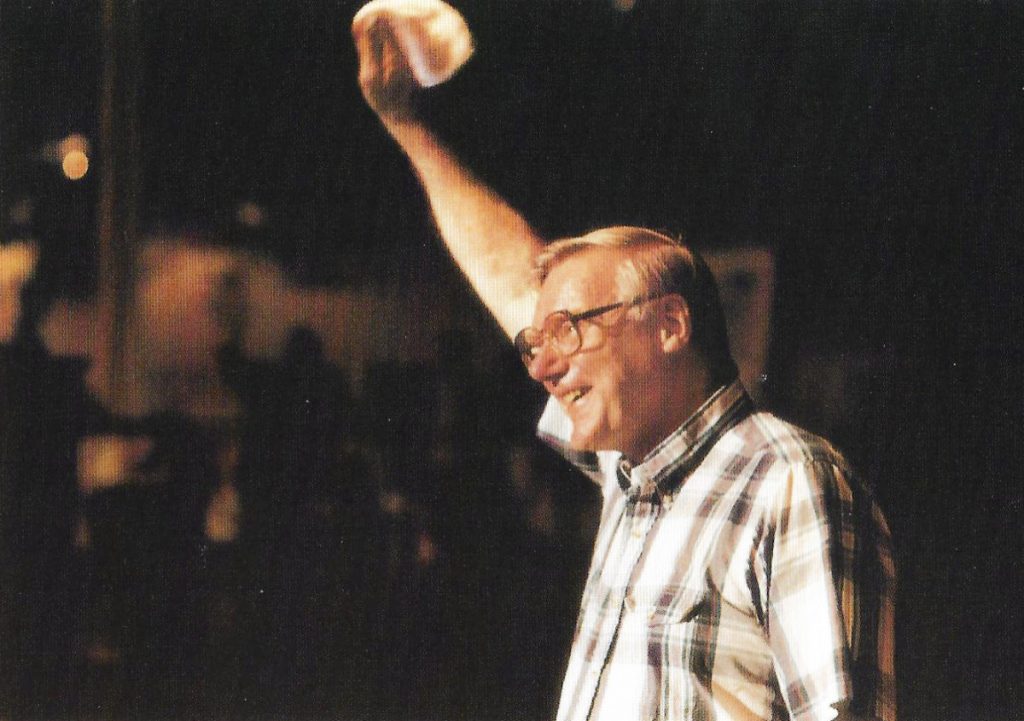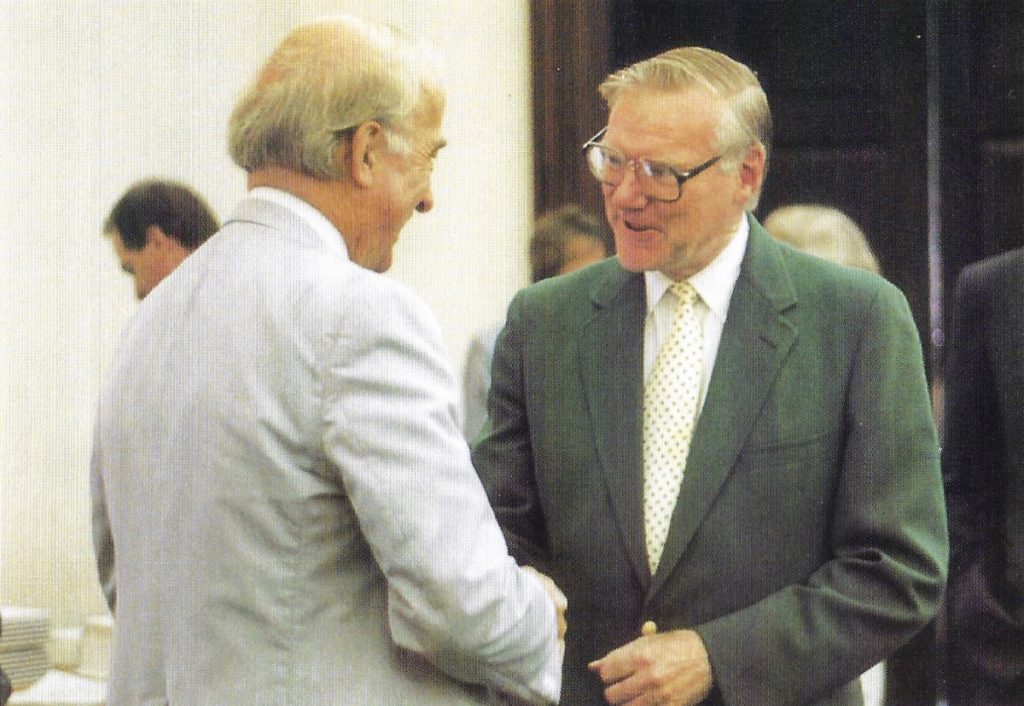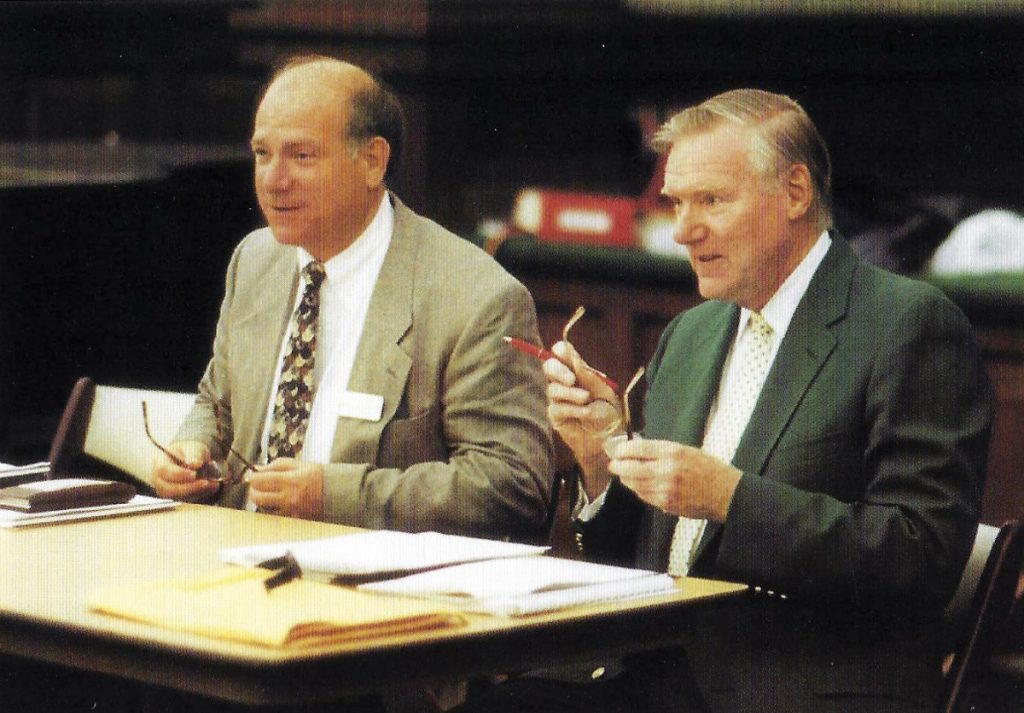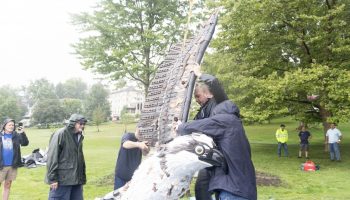Delightful, compassionate, visionary, humorous, practical, direct, kind, patient, robust. The English language does not have enough words to describe Richard “Dick” Miller.
“One word could never describe Dick Miller,” said Geof Follansbee, senior vice president and chief advancement officer.
Miller, former board of trustees chair and president of the Chautauqua Foundation, described by President Michael E. Hill as “one of the most valued leaders in Chautauqua’s history,” passed away Sept. 18, 2021. He was 88. A memorial service in his honor is set for 11 a.m. Saturday, July 16, in the Hall of Philosophy, followed by a reception at the Athenaeum Hotel Parlor.

“He was smarter than most. He was serious, yet delightfully humorous. He was visionary and awesomely practical,” said Follansbee, who considered Miller a mentor. “He was one of the most important people I ever met.”
Miller, a lifelong Chautauquan and the great-grandson of Chautauqua co-founder Lewis Miller, became actively involved with the Institution’s affairs starting in 1966, when he was appointed to the board of trustees. Four years later, he was elected chairman, and he served in that capacity until summer 1978 before leaving the board in 1981. He remained an honorary trustee until his death. He became the president of the Chautauqua Foundation, which oversees the management of the Institution’s endowments, in 1971. He served in that capacity for 25 years, retiring in 1996 after 30 years of leadership at Chautauqua.
“I know that he spoke of his work at Chautauqua as being the most rewarding aspect,” said Cindi Smith, Miller’s daughter. “He was a corporate lawyer, and he really enjoyed that. He was a partner in the Milwaukee law firm of Foley & Lardner and was very successful. He really thrived in his volunteer work at Chautauqua, and it gave him great personal satisfaction and joy to be able to participate in that work.”
When Miller first joined the board, The Chautauquan Daily reported that the Institution “had virtually no private assets, and dilapidated structures … were literally falling apart.” Upon his retirement, the Daily noted, “It’s no wonder people maintain that Miller and his colleagues saved Chautauqua.”

“He’d look at situations, or at people, or at events, and would be able to see the surface and the depth of things. He could see how things were connected, and he could also see how things were not connected. He saw gaps,” said Tom Becker, the 17th president of Chautauqua Institution. “From 1985 forward, I worked with him intensely — and the thing about him was that he was constantly looking at those gaps. What was done and what was yet to be done. He drove toward improvements, but at the same time he was looking upward and onward for the next set of things we needed to accomplish.”
Miller is credited with revolutionizing the Institution’s financial planning and spurring a renaissance at Chautauqua.
“Whether we were laying foundations that were strong enough to hold up the things that we were then doing, he had almost an architect’s sense of how to construct the development of the Institution,” Becker said. “Not physically, but structurally, in the sense of its organization, its management, its intelligence and its foundations.”
In the 1970s, Chautauqua was operating at a deficit and accruing debt. Programming was in flux, and attendance was low. Miller led the charge to revive the Institution. He established new budgetary practices and spearheaded work with the Gebbie Foundation to right Chautauqua’s ship. With their support, he created the Gebbie Challenge, which required the Institution to balance its budget for five consecutive years in return for a $1 million grant to eliminate the debt. That challenge was a success.
“There is no one as important in the life of this institution. There’s Vincent, there’s Miller, there’s Arthur Bestor, and there’s Dick Miller,” Follansbee said, referencing Chautauqua’s co-founders John Heyl Vincent and Lewis Miller, as well as Arthur E. Bestor, who served as president for nearly 30 years. Bestor shepherded the Institution into a new era, and then oversaw both its entry into receivership in 1933, and the clearing of that debt in 1936 — a move that the Institution avoided in the early 1970s thanks to Miller’s efforts.
“There’s reason to believe that if Dick hadn’t come along when he came along that this Institution might have continued on a path that would lead us back into receivership,” Follansbee said. “I’m not sure that we would have recovered after a second receivership within 40 years. Dick realized what we needed … to recapture the mission.”
While Miller revolutionized Chautauqua — during his time at the Chautauqua Foundation, it grew 25-fold, and the Chautauqua Fund was transformed into a major source of revenue — his effect on people stood out as much as his efforts.

“Everybody talks about how smart he was. He also was delightful. He had a very quick wit, a robust and engaging laugh,” Becker said. “He was the most demanding man I knew who was also accompanied by a depth of kindness. Those aren’t always things that go together.”
Becker described this depth of kindness as soulful.
“He cared not just about the appropriateness of his behavior, he cared about what was really going on in your life,” Becker said. “The depth meant that he was willing and, indeed, interested in something more than the surface of your feelings. His expressions of kindness … were something you could count on.”
Miller made significant impacts on the lives of the people he knew.
“He was a hero of mine,” Follansbee said. “I don’t know how you could respect anyone more than I respected Dick Miller.”
Miller fostered the growth of the Institution along with the growth of those he worked with and served.
“He was the closest thing to a father figure in my life since my dad’s death, and I don’t mean that in the sense that he took responsibility for me, but rather that we started with a mutual engagement about work and a passionate commitment to trying to do it really well,” Becker said. “We went from that kind of partnership to a friendship, and then to a genuine sense of love between us. He made me a better man.”
Miller, much like his great-grandfather, was dedicated to Chautauqua and its excellence.
“Those founders were remarkable for the differences between them, but also for their courage and the radical nature of what it is they were trying to do,” Becker said “I think about Dick having absorbed that legacy, … as a professional and as a man, and the way he devoted himself to the Institution, the difference he made in the place during the time he actually worked for it — and with it had every bit the kind of impact that his great-grandfather had.”
Miller himself was “Grandpa Dick” to numerous grandchildren. He’s survived by his wife, Miriam Reading; his children, Richard H. Miller Jr. and his wife, Pam, and Cynthia Miller Smith and her husband, Paul; and his grandchildren Sydney, Cameron, Rachel, Lindsey, and Maggie. A daughter, Sarah Miller Caldicott, preceded him in death; her children, Connor Caldicott and Nicholas Caldicott, wife Alexa, and his great-granddaughter Charlotte, survive him. He is further survived by five stepdaughters, many nieces, nephews, cousins, great-grandchildren, and his ex-wife, Sylvia Lucas Miller.
Smith, Miller’s daughter, said that he loved walking the grounds with his dogs and his wife, Reading.
“They maintained their interest and love for Chautauqua and he, I think, just instilled a lot of that valor in us,” she said.
Miller continues to live on in legacy, memory and love.
“He was compassionate. He was careful. He was insistent and uncompromising in ways about integrity and advancement. But he was also understanding about the human condition. He was so much smarter than I am. He was so patient with me,” Becker said “… It was an unlikely partnership, to be sure, but one that fed both of us. I loved him very much. I still do. He’s one of the most remarkable men in my life.”




